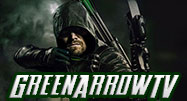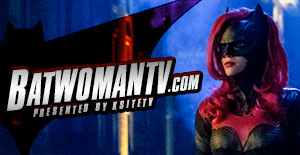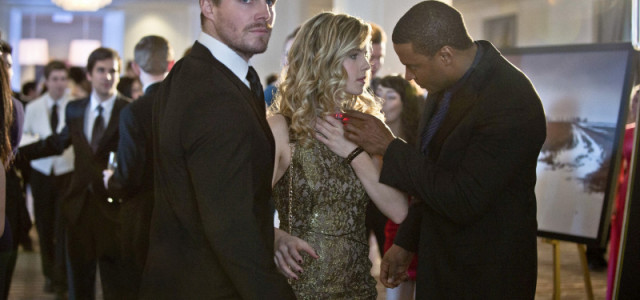
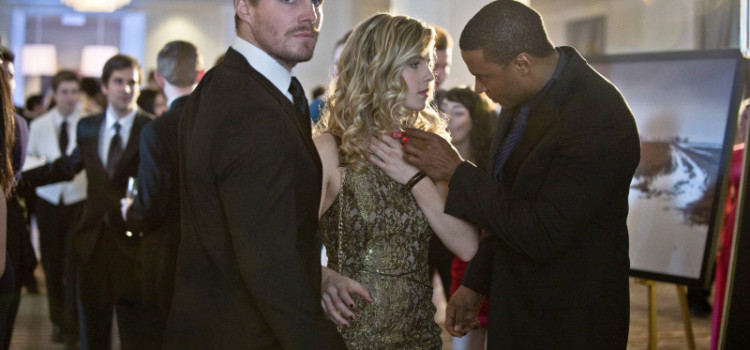
Arrow #1.15 “Dodger”/#1.16 “Dead to Rights” Review
Recaps & Reviews March 2, 2013 Matt Tucker

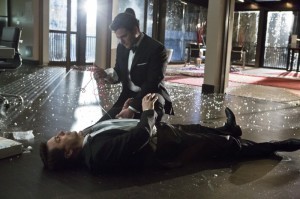 In an effort to cover the complete series, GreenArrowTV is catching up with missed weeks of reviews with double features this week. See Derek’s reviews for “Betrayal” and “The Odyssey” here.
In an effort to cover the complete series, GreenArrowTV is catching up with missed weeks of reviews with double features this week. See Derek’s reviews for “Betrayal” and “The Odyssey” here.
Summary: Two different but jam-packed episodes build on the shaping of the last few weeks and continue to evolve the series into a top-flight action drama. One incorporates a new team member and dynamic into the mission, while the other explores the emotional depths of our characters to solidify our connection as an audience.
If you have not seen this episode yet and do not wish to be spoiled, do not continue reading!
Recaps
For a full recaps of these episodes, please visit “Dodger” and “Dead to Rights” in our handy episode guide.
Buckle in, folks…
 “Dodger” Review
“Dodger” Review
There is a certain maturity of tone and voice in the series that has come to the fore in the past few weeks that has notched this show up to another level. Yes, there are times when the action still doesn’t quite hit the mark, the scale doesn’t quite match the ambition — really, Cyrus Vanch, a “veritable army” of … 3 or 4 guys? — and the dialogue thumps with the weightiest of lead weights. But a stride and assuredness has taken over the proceedings that has strengthened the cast and performances, tightened the plotting and pacing even further, and begun to create momentum running up to the finale that makes one wish there was just another scene, another act each week at the end of its hour. It’s compelling television and makes Arrow a niche that no other show on the air is filling right now.
This can be felt none more so than in the guest casting and use of villains and with “Dodger” that continues with a strong performance from Battlestar Galactica (and Bridget Jones’s Diary) alum James Callis. It’s nothing we haven’t seen from Callis before. In fact, it felt like a cross between a less histrionic Gaius Baltar and the thief he guested as on Merlin. But it was played to perfection and on a human scale that lent more credibility to the entire outlandishness of his M.O. It’s always tricky to play the Villain of the Week plot just right, knowing that it is going to be wrapped up in the span of 42 minutes and stuffed in amongst other evolving plots involving the main cast. Yet, Callis has such a good command of his presence that you still felt a solid threat in such short time, unlike the loosey-goosey bark of Vanch’s bite from a couple of episodes earlier. (The sketch of Vanch was saved by David Anders’ own charisma.)
What really fed into the appeal of this episode, though, was the full inclusion of Felicty Smoak in the Team Arrow shenanigans. Emily Bett Rickards is already a fan-favorite, so much so that she’s been promoted to regular cast member for the series’ forthcoming second season. Having Felicity’s voice and energy in the Arrowcave alongside broody Oliver and righteous Diggle is welcome and refreshing. Yes, by all means, it’s a tad bit tacky that a woman has to come in to convince the boys that they need to have lives outside of this quest, but Felicity is just the kind of person who can’t help but put a microscope on other’s behavior for them. She’s the right kind of outside influence to help both men become and stay complete people, a perfect third to a necessary triangle, and it’s the right evolution of the work she was already doing for them. As a crusader in her own right, shown in her interactions with Walter Steele, this is actually a wonderful outlet for Felicity also. With allusions to a somewhat solitary life devoted to work, it looks as if she’ll benefit from this partnership in finding fulfillment in her life as much as her cohorts. It was also a smart decision to deal with her reluctance to work with them right up front. We know Ollie’s dogged focus has caused him to butt heads with Diggle on a few occasions already, so it’s not hard to see him running up against Felicity. Rather than drag that dynamic out, they broach it immediately and organically. What’s more is they indoctrinate her into the club with a trial by fire, confronting the Dodger herself and nearly giving her life for it. Bonds forged in flame.
As for the gents’ lives outside of Hood-dom, it was a nice B-plot to include the balancing dynamic of both trying to allow some romance into their lives. Many like to complain about the soap opera-esque aspects of this series, claiming that they are around merely to attract the larger female CW audience. What’s often lost in that argument is just how much of these romantic angles actually appear in the source material comics themselves. They are an aspect of humanity, and as the series is trying to show people living and struggling with their lives relationships will always play a big part in that. Here are two damaged men, unsure if they are worthy of any mate let alone the objects of their affection. The specter of John Diggle’s brother will always hang around his relationship with Carly and it was compelling to watch the two of them play with that reality. Just as compelling watching Oliver try to navigate opening himself up to McKenna Hall, a character who didn’t make much of an impression in her earlier appearance but here shows an intriguing chemistry with Oliver that’s quite different from what we’ve seen of him with either Laurel or Helena Bertinelli. Personally, it felt like McKenna came down on Oliver too hard as she was clearly prying into a very touchy subject with the man, but it was nice to see Oliver allow himself the opportunity to explore his heart more. Material aside, both David Ramsey and Stephen Amell were astounding in their performances, truly invested in every moment and painting in delicate strokes to show a wide variety of emotion and reaction throughout.
Following up on the outstanding outing of the island story in the last episode, Oliver is confronted by a bound and tortured man who may be another shipwrecked victim or a soldier in disguise trying to appeal to the naivete and compassion Oliver had demonstrated through is first six months in exile. We’ve certainly talked her at GATV about the disconnect of the flashback tale with the main action going on in the present and I’ve floated the idea before that they are merely telling the island story rather than necessarily trying to use it to identify some theme or enforce a moral of a given episode. This week’s installment walks a line between both, clearly informing Oliver’s reluctance to open up about his experiences on the island with anyone currently in his life but also primarily defining a shift in his behavior and approach to life on the island. It was thoroughly impressive — and appreciated — that they didn’t reveal the truth behind the injured man, leaving us to determine for ourselves if Ollie was justified or paranoid. More importantly, it built an even stronger connection between he and Slade Wilson, without needing to be spoken. It’s yet another moment of a little death in the effort of survival. Outside of the stellar “The Odyssey,” and alongside the flashback to Oliver’s first kill of the bird back in “An Innocent Man,” it was one of the more captivating island moments we’ve seen on the show.
Finally, we are introduced to one of the most important figures in the Green Arrow world of the comics, a one Roy Harper. Introduced to the world in the same issue as Oliver Queen, it was only a matter of time before the boy who would be Speedy would put in an appearance on the series. Here, they do it in an arbitrary but fun way, tossing some nods to Roy’s unsavory periods in his own long saga. Colton Haynes acquitted himself wonderfully, setting up both a fun adversarial relationship with Willa Holland’s Thea Queen, as well as a possible love interest. While the red hoodie was a tad bit too anvil-y for my taste, the use of the story about his mother being hooked on Vertigo and forever altered as a motivation for his criminal behavior was an intelligent and rational acknowledgement of Speedy most infamous story from the comics, his one-time heroin addiction. What made it an even better story was that it was a complete fabrication; Harper lied to the cops and got Thea to drop her charges with it. As it stands, we know nothing of Roy Harper and it’s a superb way to introduce a character who will likely be spending a long tenure in this world. More, it gave Thea a promising storyline outside of her teen angst and drug abuse tropes. Anything that can give her more to do gets a thumbs up.
“Dodger” is an episode packed to the gills with plot and character, perhaps a bit overflowing as such. Still, it continues a trend of strong episodes building to what one hopes is an engrossing climax.
“Dead to Rights” Review
So stuffed was “Dodger” that we haven’t even spoken yet of the episode’s D plot that sets up the main thrust of the action in this week’s episode: Moira Queen turns to the Chinese Triad to take out a hit on Malcolm Merlyn. It’s obvious, at one point, that the Merlyns and Queens were rather tight friends. That bond led to their involvement in the clandestine “Tempest” group, yet at some point mistrust began to set in. In the case of Robert Queen, this was prior to and likely led up to the sabotage of the boat that eventually brought on his death and Oliver’s island ordeal. It hasn’t been made clear when it began for Moira but knowing Malcolm was behind the sinking of the Queen’s Gambit has caused a rift for her in the last five years. It was but a matter of time for her to make a move and this is it, a request that sets off the action of one of the best episodes of the series to date.
Comics guru Geoff Johns, who already contributed as a co-writer to the Huntress episode “Muse of Fire” earlier in the season, takes on his first solo installment and it’s a masterful effort. In fact, between the three episodes of Smallville and the two he’s worked on here at Arrow, this is his most accomplished work. Just like those previous stories, this one is chock full of characters ripped from the pages of DC Comics and references to the print DCU that help expand the live-action universe here. From the use of Guillermo Barrera, the villain Brutale in the comics, as the sacrificial hitman to start the episode; to Lawton’s place at the Blüdhaven Apartments; to the Nanda Parbat mention from Malcolm that sets up a wide array of possibilities; Johns weaves a dense, well-crafted story that strengthens the very existence of the series itself. Perhaps a bit hyperbolic but nonetheless true.
Without a doubt, the strongest element of this chapter is its surprising emotionality. If there is one thing that has been a fair criticism of the series so far, it is that there has been somewhat of a detached quality to the proceedings, an invisible sheath that has kept the audience from fully investing in the characters on an emotional level. That sheath has been pushed on at various times but “Dead to Rights” is really the first episode that thoroughly breaks through. As such, being the last episode before the second long break of the season — the spring hiatus — it deepens individual characters, explores relationships, and sets up stakes much like a mid-season finale. This actually does a much better job of doing that than the excellent “Year’s End” did heading into the winter hiatus.
As Malcolm is the intended target, the key figure this time around is Colin Donnell’s Tommy. Both his relationship with his father and his friendship with Oliver are put to the test with far-reaching implications for all involved. Much like David Ramsey, Donnell has a gift for subtle work and a particular skill in playing off of the other actor in a scene quite well. Sadly, Tommy has mostly been underutilized so far, and the highlight of this episode is that has all just changed. The interaction between Donnell and John Barrowman was flawless and peeling back layers of their troubled relationship brought out a true connection as well as a history beyond the emotional abandonment trope. None of what Tommy described as his childhood was especially revelatory, but how informed Donnell was in Tommy’s background lent an emotional life that suddenly made it its own unique narrative. Barrowman was there with him every step of the way and theirs just became one of the more compelling connections on the show.
“Were you ever going to tell me?”
“No.”
Quite possibly the most heartbreaking moment of the series so far was this exchange between Tommy and Oliver. After further establishing and strengthening the brotherly bond between the two friends throughout the episode, including a terrific scene at the Chinese restaurant, this stark naked admission by Oliver was not only brutally honest but a heckuva gutpunch that suddenly changes the whole dynamic of Oliver’s world. From the beginning of the season, one had to wonder when and if Tommy would find out about his best friend’s extracurricular activities. They set up right in the pilot that Tommy likely saw exactly what Oliver had done to the kidnappers to save their lives, and kudos to Johns for tying right back into that. In all honesty, Tommy’s discovery had actually become so backburnered throughout the course of the season that when Oliver revealed his identity as the vigilante it was a nice surprise. It wasn’t shocking, though, because it came from a place of character and circumstance rather than arbitrary happenstance. So many shows in similar set-ups would’ve found some way to keep Oliver’s identity just as he was about to reveal it to Tommy. That he chose to do so as a way to prove trust, knowing just how well he could shatter that trust in that moment, was not only smart but it was realistic. It’s a choice an actual person would make, not just a character driven by plot. These moments and everything played between Donnell and Stephen Amell this chapter –including the fun little jab at Laurel’s cooking ability at Tommy’s birthday celebration — were exceptional.
Not enough can be said about the ways Amell has grown into his part so much this season. Every week it seems we find a way to express how Amell turns in better and better work as an actor, and this week is no exception. It’s become a joy to see the distinct ways he deals with each disparate element of Oliver’s life. The charm and lightness he now exudes, particularly in his interactions with McKenna Hall. I wasn’t sold on actress Janina Gavankar at first, but there is a lovely chemistry between her and Amell that has helped to elevate those softer elements of Oliver that we needed to start seeing in him. The way he plays the youth and inexperience of Oliver on the island is simply astounding. The change in his voice and energy really helps to sell Oliver’s evolving transition into what we see five years down the road. And working with the thoroughly solid Manu Bennett has made the times on the island immeasurably more fascinating. Most important, the delicate emotional work Amell has brought to the damaged present-day Ollie has turned him into a man who cares deeply, a man we can root for.
All the feeling stuff aside, another aspect of Johns’ writing is we get some of the better uses of DC characters on a show. For the first time, Kelly Hu’s China White feels like a fully-realized character. Her intelligence and meticulousness shine through and, though she’s been an effective living prop to help establish the world of Starling City, this is the first time she’s really felt like a viable threat. Director Glen Winter, normally the DP of the series, manages to be the first to really highlight Hu’s martial arts abilities well and the fight between China and the Hood, despite too many changes in angle, was exhilarating. Even better used than his last appearance was Michael Rowe’s Floyd Lawton, aka Deadshot. Much closer to his comic counterpart, and with a much better eye reticle this time around, it was a thrill to see a Deadshot with more personality peeking through. One looks forward to his development as the series goes on, particularly as John Diggle now has his own villain to pursue. Johns also having the opportunity to write Slade Wilson managed to bring out even more of his humorous side and Bennett’s comic timing mixed with his hard edge sold every bit of it.
All in all, “Dead to Rights” is a defining episode for how the series should continue and a perfect cherry to put atop the sundae that has been this last run of episodes. It’s a smart outing that doesn’t take its audience or its characters for granted. It’s well written, well directed, well acted and serves as a hub from which to spin out many storylines and scenarios. Malcolm’s mention of Nanda Parbat as a retreat following his wife’s murder allows so many connections to what we’ve already seen on the series and possibilities of what could be coming. A hidden Tibetan location with connections to the Great Ten, a prominent group in the modern DC Comics of which the comic Yao Fei is a member, possibly tying Malcolm, Fei, Shado, the island, Fyers and his mysterious benefactor together. The location was also tied to one of the more mysterious figures of the DCU, Rā’s al Ghūl of Batman fame, for a time being. Also, Boston Brand, the Deadman, is most intimately connected with place, and as the CW was previously working on a Deadman pilot, who knows what that could portend for this series.
The bigger cliffhanger, of course, is the arrival of Alex Kingston’s Dinah Lance, Laurel’s mother. We’ve long suspected here at GATV that Laurel’s sister Sara might not have perished in the ship accident. Is it possible she’s alive? Is it possible someone is trying to make the Lances think she’s alive? How all does this tie into Dinah’s disappearance from her family’s life? And is it possible Mama Lance has some crimefighting inclinations of her own? This episode does what all good “finales” do; it leaves us with lots of questions.
Odds & Ends
- The anvil-esque allusion to a character’s future endeavors in their clothing on a show like this can be kind of annoying. Roy Harper’s red hoodie is a good example. But, the subtle shoutout to Dinah Lance’s Black Canary outfit in her clothing was fantastic, black clothes with a blue-grey overcoat.
- Director Glen Winter directed two of the three episodes Geoff Johns wrote for Smallville, “Legion” and “Society” (Absolute Justice, Part 1), and they have a great rapport that shows up in the work. As Arrow‘s Director of Photography, it’s fun to see him experiment with many different things, specifically the distorted filter used to show Lawton’s POV.
- Something that made no sense: if Roy was arrested for having stolen Thea’s purse, why wouldn’t the police have picked up the purse at that time? It was a big logic gap to set up that final scene between Thea and Roy.
- Felicity (and Emily Bett Rickards) sure looks great in a party dress.
- While it was cool to have an episode featuring two of Doctor Who’s cohorts/companions — Kingston is well known as River Song, and Barrowman, of course, is Captain Jack Harkness — I will always think of Doctor Elizabeth Corday first whenever I see Kingston.
- The whole sequence where Oliver reveals to Diggle that Lawton is alive and Diggle walks down the lighted passageway to process the news was stunning. Ramsey did it again!
- The way the action was filmed in “Dead to Rights” was probably the best it’s been since the pilot.
Matt Tucker Editor/Senior Writer/Reviewer
Matt Tucker is a stage and film actor, writer, Seattleite, comics nerd, sports fan, and aspiring person. Someday, he’ll be a real boy. He's an editor and senior writer for KSiteTV network (GreenArrowTV, DaredevilTV) and the sports blogs Sonics Rising and Cascadia Sports Network. Follow him on Twitter at @MattBCTucker or @TuckerOnSports
Arrow Reunion Picket Set For August 11
News Aug 4, 2023
Stephen Amell Is Returning To The Arrowverse!
News Jan 8, 2023
Happy Arrowversary!
News Oct 10, 2022
Mia Queen Returns For The CW’s “Armageddon”
News Aug 25, 2021
Arrow Season 8 Blu-ray & DVD Coming April 28
News Feb 5, 2020
End of an Arrow: Thoughts on the Series & Finale
News Jan 28, 2020
